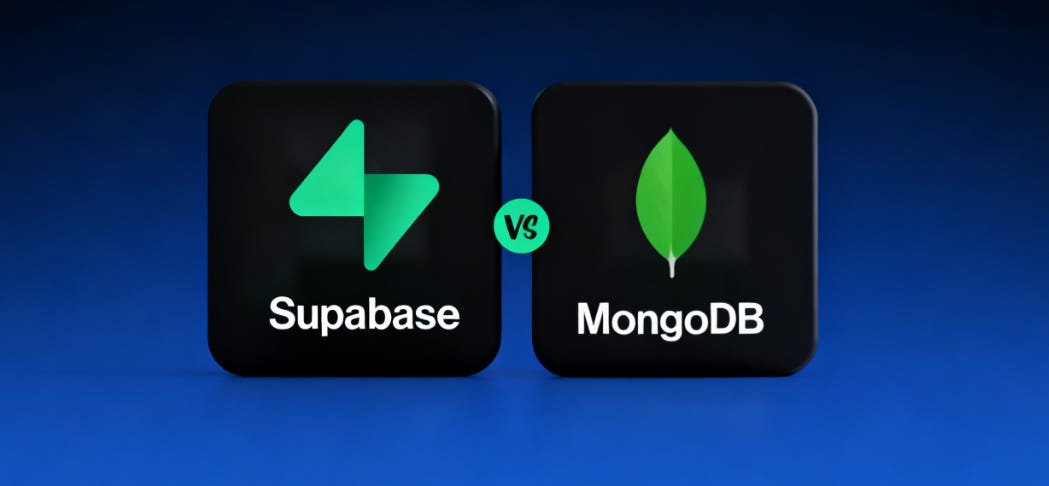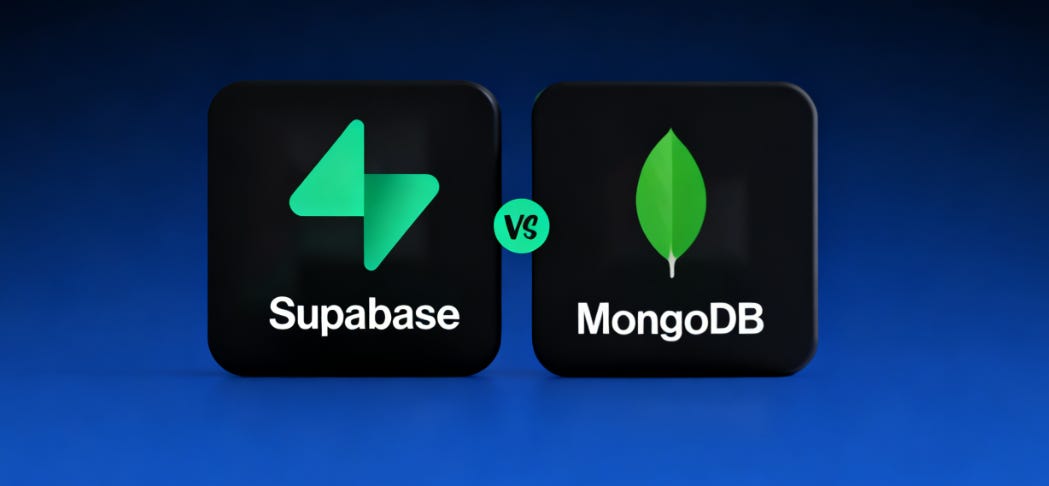Supabase v/s MongoDB
Since you mentioned you've never worked with Supabase, let's start with a quick overview to set the context. Supabase is an open-source Backend-as-a-Service (BaaS) platform built on top of PostgreSQL, a powerful relational database. It provides not just a database, but a full suite of tools like authentication, real-time subscriptions, file storage, and edge functions—essentially an "open-source alternative to Firebase." This makes it great for quickly building web and mobile apps without managing a lot of backend infrastructure.MongoDB, on the other hand, is a NoSQL document-oriented database designed for flexibility and scalability. It stores data in JSON-like documents, which is ideal for handling unstructured or rapidly changing data, but it's primarily just a database—you'll need to build or integrate additional services (e.g., for auth or real-time updates) yourself
.
The key difference is scope: MongoDB is a database engine (with a managed cloud option like MongoDB Atlas), while Supabase is a complete backend platform powered by a relational DB. This leads to several advantages for Supabase, especially if you're new to it and want to focus on app development rather than ops. Below, I'll outline the main advantages of Supabase over "regular" MongoDB, based on feature comparisons.Advantages of Supabase Over MongoDBHere's a structured comparison highlighting why Supabase might be a better fit for many modern apps, particularly for developers or small teams:
Aspect
Supabase Advantage
Why It Matters for You (New to Supabase)
Built-in Backend Services
Includes authentication (user sign-ups, OAuth, JWT), file storage, and serverless functions out-of-the-box. MongoDB requires separate integrations (e.g., with Auth0 or AWS S3).
You can prototype a full app faster—no need to wire up extras. Quickstarts for frameworks like React or Next.js make onboarding easy.
Real-Time Capabilities
Native WebSocket-based subscriptions for live updates (e.g., chat apps). MongoDB's change streams exist but need custom setup and aren't as seamless.
Ideal for interactive apps; just subscribe to table changes in code—feels magical and reduces boilerplate.
Data Consistency & Relations
Uses PostgreSQL's ACID transactions, foreign keys, and JOINs for complex relational data. MongoDB's flexible schema can lead to inconsistencies in relational scenarios.
If your data has relationships (e.g., users → posts → comments), it's more reliable and queryable without workarounds. Great for structured apps like blogs or e-commerce.
Developer Experience & Speed
Auto-generates REST/GraphQL APIs from your schema, plus a visual Studio dashboard for queries. MongoDB needs manual API building.
Less code to write; as a newbie, you can focus on logic, not plumbing. Users report 2-3x faster prototyping vs. MongoDB setups.
Open-Source & No Vendor Lock-In
Fully open-source (no SSPL-like restrictions like MongoDB's past licensing drama), self-hostable, and uses standard Postgres tools.
Avoid lock-in; extend with familiar SQL skills. Community templates help you ramp up quickly.
Scalability for Startups
Vertical scaling + read replicas; handles growth without deep ops knowledge. MongoDB excels at horizontal sharding for massive unstructured data but requires more config.
Easier for small teams—Supabase manages infra, letting you scale focus on features. Better for AI/ML too (via pgvector for embeddings).
Cost & Simplicity
Free tier with generous limits; pay-as-you-grow. MongoDB Atlas is flexible but adds up with add-ons for auth/storage.
Lower barrier to entry; no surprise costs from piecing together services.
When Supabase Might Not Be IdealTo be balanced, MongoDB shines if your app deals with highly unstructured data (e.g., IoT logs) or needs extreme horizontal scaling across millions of documents. Supabase's relational core might feel rigid there, and you'd lose some NoSQL flexibility.Getting Started with SupabaseSince you're new, I recommend their docs (supabase.com/docs)—sign up for a free project in minutes. Try a simple CRUD app with their JS client: npm install @supabase/supabase-js. It's intuitive if you know basic SQL or JS.



